
*****
The editor is grateful to Timothy Adès and all the translators who have worked with him for the commitment they have shown in producing the splendid array of work contained in the translation feature. [Ed]
*****
Editing this Supplement has been an absolute delight. Free of the economic constraints of print, so odious to editors and even more to contributors, I have been able to accept everything and exclude nothing. And with little prompting, I’ve been regaled, deluged with exciting material.
This Supplement is arranged in two parts: before and after 1900. First, something from the remote past of Arabia: English verse from French prose. Then to the nineteenth century, which still dominates our reception of French poetry, with so many great poets – among them Hugo, who in his time outweighed them all. And he noticed children: not many great poets do. Rilke leads us into the 20th century, the most widely translated modern poet from German, latterly writing in French. Devout Francis Jammes with his prodigious beard; Oscar Milosz, Lithuanian diplomat; Robert Desnos the surrealist, a Resistance martyr; a woman Marie-Claire Bancquart translated by a woman, Anna Gier, a newcomer I am proud to introduce; finally George Goddard, translating his own St Lucian Kweyol; Gilles Ortlieb; and Maram al-Masri: three poets alive and flourishing today. [TA]
*****
NB: For most of the poems included there are links to original French texts.
The Poets:
Romance of Antar and Abla • Victor Hugo • Charles Baudelaire • Arthur Rimbaud • Aloysius Bertrand • Théophile Gautier • José-Maria de Hérédia • Rainer Maria Rilke • Francis Jammes • Oscar V. de L. Milosz • Robert Desnos • Marie-Claire Bancquart • George Goddard • Gilles Ortlieb • Maram Al-Masri
Lucy Hamilton • Timothy Adès • Will Stone • Stuart Henson • David Malcolm • George Goddard • Anna Gier • Stephen Romer • Hélène Cardona
*****
PART ONE: BEFORE 1900
*****
Lucy Hamilton: From ‘The Romance of Antar and Abla’
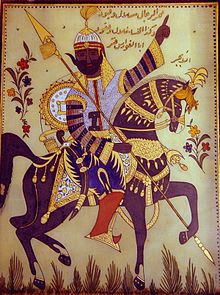
Introduction
Antarah ibn Sheddād is the hero of one of the great pre-Islamic epics of the Arab world. Part historical and part mythical, it is the story of a black slave born to a noble Arab father and an Ethiopian slave mother, and of his long quest to achieve nobility in order to win the right to marry his beautiful cousin Abla. Although it belongs to the same tradition as The Arabian Nights, unlike that epic it was never adopted by Western literary tradition which, according to Driss Cherkaoui, is because it does not so obviously share transcultural religious or fantastical literary features. That said, it does mention several familiar biblical characters, including the Prophet Issa, Jesus.
The story of Antar and Abla takes place in Saudi Arabia and, in the great tradition of oral epic, was passed down through the generations by highly skilled and equally valued reciters, until the 8th century CE when fragments began to be written down and collated. These Arabic versions run into hundreds of volumes. My source is Le Roman D’Antar D’Après Les Anciens Textes Arabes by Gustave Rouger (L’Édition D’Art, H. Piazza, Paris 1923). In my terza rima version, I have kept to the structure of Rouger’s book, which is in three parts with five or six chapters in each part. My cantos comprise five poems of eight tercets plus a single hanging line. I have also drawn upon Driss Cherkaoui’s seminal work, Le Roman de Antar: Perspective littéraire et historique (Presence Africaine, 2001), my aim being to privilege the Arab perspective over the European.
As with Rouger’s book, my version begins with a Prologue introducing Antar as the greatest Arab warrior, whose example in the ‘time of ignorance’ paved the way for coming of the Prophet Mohammed. Canto One introduces the ancestors of the Bedouin tribe, its king and social mores, and deals with the first raid and with Antar’s birth and early childhood. In Canto Three, where this extract begins, Antar is already on his quest to win the beautiful Abla’s hand in marriage.
CANTO THREE THE POOL AT ZHAT AL ARSAD
I
Days passed. Shaddād’s uneasiness had doubled.
xxxxxHe sought his loyal brothers, Mālik and Zahmat,
xxxxxand told them he predicted tribal trouble.
They plotted to ambush Antar somewhere far,
xxxxxhis disappearance would be unobtrusive,
xxxxxthey feared that one day he might kill a Shah.
Dawn brushed the trees as, unaware of the ruse
xxxxxand dreaming of his sweetheart’s flowing locks,
xxxxxAntar departed, his mood light and effusive.
He sang as he went, driving the herds and flocks,
xxxxxpausing to find some edible thistle roots,
xxxxxsearching the sky for the trailing legs of storks.
He leaned against the tree of little fruit,
xxxxxthat stunted bush that once, in paradise,
xxxxxhad been profuse but now refused to fruit:
the Lote-tree whose cruel thorns chastise,
xxxxxthe thorns that men crushed down on Issa’s brow
xxxxxbefore he died, and blood poured in his eyes.
Now Antar found himself on treacherous ground:
xxxxxthe desolate and dangerous Valley of Lions.
xxxxxHere, the schemers lay hidden behind a mound,
and here, on land a wilderness for aeons,
xxxxxthey waited to kill Antar, to leave no trace.
xxxxxThey didn’t know their scent had drawn a lion,
that stalking through the grass it crept apace.
II
When Antar saw the lion his muscles flexed,
xxxxxhot-headed and impatient for the tackle
xxxxxhe sang as he leapt into action as if by reflex:
O lion, O father of lion-cubs, O jackal
xxxxxof the sands, O king of lionesses, welcome!
xxxxxSo strong and proud, how great will be your fall.
Prepare to meet your doom, to be undone.
xxxxxBut I’ll not end your days by sword or hatchet:
xxxxxyou’ll drink the drop of death by my hand alone.
For, of us two, I am the lion in combat.
xxxxxO watch me throw away my man-made weapon!
xxxxxObserve my open hands, O dog of the desert!
Bare-handed he advanced towards the lion
xxxxxwhich growled and opened up a cavernous mouth
xxxxxthat he’d no intent, far less desire, to lie in.
He ripped its jaws in two to north and south
xxxxxwith a terrible cry that echoed round the gully ―
xxxxxan awesome feat for such a tender youth ―
and then he slit the beast’s soft underbelly
xxxxxand skinned and chopped the body into bits.
xxxxxThe conspirers felt ― on smelling smoke in the valley ―
loath to end up where he roasted it,
xxxxxand so the three, discussing the events,
xxxxxwithdrew, and in plainly disconcerted spirits
set off again on the long trek back to the tents.
III
When rumour of this exploit reached the king,
xxxxxwho wanted to lead his men against the Tamim,
xxxxxhe placed the camp under Antar’s protective wing.
Soon Antar heard of the women’s audacious plan
xxxxxand knew it was Shaddād’s wife who proposed
xxxxxto take a feast some distance from the camp.
Although unwise, he didn’t dare oppose her
xxxxxor the eager girls. Moreover, how could he
xxxxxresist the chance to gaze upon his Rose?
Springtime! and a rich variety
xxxxxof flowers clothed the hillside in a vivid
xxxxxtopcoat for as far as the eye could see:
white and yellow marguerites, blue orchids
xxxxxin contorted shapes, violet irises
xxxxxand perfumed tubers, acerbic and acrid,
weaving their arabesques. Here ilex trees
xxxxxleaned and dipped their broad leaves into the water
xxxxxof the Zhat al Arsad pool. And in the breeze
all the young girls and women, all the daughters
xxxxxof the tribe adorned in their best ornaments
festooned the banks, blooming like living borders.
Though Antar was abstemious and attentive,
xxxxxas Abla danced, he glimpsed her unveiled breast
xxxxxand didn’t expect, in all his ravishment,
some seventy warriors swarming down the hillcrest.
IV
The Qahtan cavaliers, in coats of mail,
xxxxxswooped down on the easy prey of girls and women
xxxxxand scooped them up despite their frenzied wails.
When Antar heard his Abla calling him
xxxxxas she was snatched and thrown across the saddle
xxxxxof one of the ferocious-looking men,
he leapt like a panther, leaving the man unsaddled:
xxxxxdead of a broken neck. He killed or maimed
xxxxxsome thirty men and thirty more skedaddled.
Now Antar rushed to Abla where the women
xxxxxwere helping to revive her. Tears of relief
xxxxxand gratitude fell wet on their cheeks like rain.
Sumayya, though, had reason to believe
xxxxxher husband would blame her, and so she made
xxxxxhis son vow that he’d not inform the chief.
Not one of the men returning from the raid
xxxxxobserved the equine imposters. The following day,
xxxxxShaddād went to the pastures and was amazed
to witness Antar on a pedigree
xxxxxof great distinction, and many other horses
xxxxxhe didn’t recognise, of equal beauty.
Shaddād now questioned his son, who lied in the cause
xxxxxof duty: maintaining that the noble mares
xxxxxhad wandered off and lost their caravan’s course.
Shaddād was not deceived. Nor Antar spared.
V
Shaddād thrashed Antar with a grim abandon
xxxxxuntil, to his surprise, his wife cried out
xxxxxand shielded Antar with her arms and hands.
‘Enough! Enough! O stop Shaddād!’ she shouted.
xxxxx‘Don’t punish the lad. O Antar is not guilty.
xxxxxAllow me to explain how this came about.’
Shaddād let go his whip. ‘You puzzle me,
xxxxxSumayya. Why do you now defend this slave
xxxxxwhen you once hated him so vehemently?’
And in a broken voice Summaya conveyed
xxxxxthe tale. The boy was clearly diplomatic,
xxxxxhad acted honourably: Shaddād forgave him.
One night, the king’s sons feasted. The wine and liquor
xxxxxwere taking effect and loosening their tongues,
xxxxxand Antar soon was summoned by Prince Mālik
to entertain them with his verse and songs.
xxxxxJust then, and from a cloud of dust, a hundred
xxxxxQahtan warriors charged and set among
the sluggish men who were as good as dead
xxxxxbut for Antar’s instant intervention,
xxxxxwhich turned the tables: the Qahtan fell or fled.
The king was quick to show appreciation:
xxxxxa gold-stitched tunic, a sword of quality
xxxxxand a horse rewarded Antar’s dedication.
Henceforth he’d raid with the king’s own cavalry.
* * *
Victor Hugo: Eleven Poems of Childhood translated by Timothy Adès
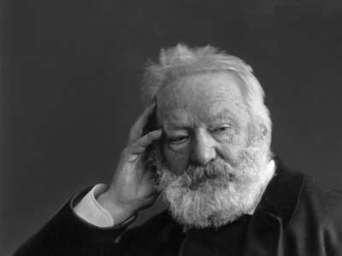
These poems are as presented in the Gallimard Jeunesse series:
some are extracts of longer poems.
From MY GOODBYES TO CHILDHOOD
I have such pleasant memories
Of when we twisted, thoroughly,
Our hankies into implements
Hardened for war and self-defence,
Took apples off the local trees,
And fired our massed artillery…
And there were dodgy rungs we climbed
With Roman pride, or twice as much:
What was that citadel we stormed?
The old neglected rabbit-hutch!
GRANDMA SPINS THREAD
Grandma spins thread. The little girl
Fancies a distaff for her doll.
Grandma nods off. Quick! Get a strand,
Creep up behind…
Tease one aside!
She parts a thread from all the rest,
The spindle twizzles to unwind,
She runs off chortling, in her hand
The golden wool, the saffron-dyed.
She’s like a bird that builds a nest.
THE CHILDREN
Four jolly children pull my jacket,
Muddle my papers, make a racket.
Sundays, I work! – It’s all the same
To them: they leap and shout my name,
They stop me writing, hide my pen,
Crouch down behind the sofa, then
In turn, with mirth uproarious
Leap up – rapscallions on the loose –
Wearing a gaudy striped burnoose.
From LIFE OUTDOORS
I sit, and they come – they know I share
Their taste for butterflies, flowers, fresh air
And animals scurrying everywhere.
They know I’m a person who’s fond of them,
They can play near me, shout and scream,
And ages ago I laughed the same:
And I laugh and I smile at them today,
Though I’m sadder now, as I watch them play.
I’m always fun and I’m never fractious,
Make cardboard models and pen-and-ink sketches:
They say so: and when we light the light,
I tell them stories that scare them at night:
I’m gentle and modest, and erudite.
They see me, and ‘Look! He’s there!’ – they’ve downed
Their toys, they run to me, they surround!
Wide eyes, so fearless and friendly too:
Such heavenly eyes, they must be blue!
Little ones climb on my knees, they’re bold;
Big ones look solemn, being so old.
They bring me a borrowed blackbird’s nest,
With scrapbooks and crayons, France’s best…
I’VE ALWAYS LOVED
I’ve always loved winged creatures.
A child among the trees,
I took the little fledglings
And built them homes of reeds.
I reared them in the mosses,
And when I opened wide,
They flew, and came when called for,
Or simply stayed inside.
I loved a lovely dove, yes,
We two were lovey-doveys!
In be-my-friend behaviours,
Believe me, I’m no novice.
From SPRING MEMORIES
In the dew she ran noiseless,
Not to wake me from night:
I opened no glass, lest
She start and take flight.
Pure dawn! My sons’ laughter,
Cool cradles and harmony,
My children and Nature,
The birds and my family.
My cough would embolden!
Light step, but grave airs:
She’d tell me “The children
Are playing downstairs.”
Contented or troubled,
My heart was my fay’s,
Well-coiffed or dishevelled,
Lodestar of my gaze.
We played until sunset:
Sweet sport, charming chatter!
At dusk she, the eldest,
Would tell me, “Come, father:
“We’ll bring up your chair, you
Can tell us a story”
Their eyes were ethereal,
A radiant glory.
So I’d make up a romance
Of mayhem and murders,
Found heroes and humans
In the ceiling’s deep shadows.
Four darlings, they snorted
With mirth at the joke:
Big dunderheads, thwarted
By quick little folk!
I’M A LOVE-CRAZED CLOT
I’m a love-crazed clot.
Hey, Grandpa!
What?
I want to go!
To go? Where to?
Somewhere.
Somewhere?
Right.
Anywhere!
Just not stay here.
We won’t stay here.
Hey, Grandpa!
What?
There might be rain.
I do hope not.
I want some rain.
Some rain? For what?
To help my beans
grow in my plot.
God makes the rain.
Well then, I want
God to make rain.
You want! You want!
Grandpa?
Yes, what?
You see this toy:
I could destroy
it if I want
and God just can’t
stop me, he can’t!
He just cannot!
All right, don’t shout.
I didn’t shout –
I just want rain.
All right, you’re right.
So will it rain?
Yes, here’s the can:
It’s Mr Green’s,
Who sows and grows.
We’ll make it rain.
Where?
On your beans
And on your plot.
Hey, Grandpa!
What?
SONG
Naughty things we used to say!
Dotty things we used to do!
Loud our voices pealed.
Now, what dotty things we say!
Now, what naughty things we do!
Now, our lips are sealed.
CHANSON
Dieu, que de bêtises nous dîmes !
Dieu, que des sottises nous fîmes!
Comme on chantait !
Maintenant on dit des sottises ;
Maintenant on fait des bêtises ;
Et l’on se tait.
KING CLOGKICKS
King Clogkicks was a hunter,
On stilts he hunted crows.
He charged for walking under
Two euros, through the nose.
Quand on passait dessous
On luit payait deux sous
LE ROI COUPDESABOT
Le Roi Coupdesabot
À la chasse aux corbeaux
Monté sur des échasses.
Quand on passait dessous
On luit payait deux sous
SONG from Les Misérables
The moon’s up, dearest,
Let’s go to the forest,
Said Lenny to Lou.
ton ton for Kensington
I haven’t a thing
just God and a king,
one sou and one shoe.
Sun’s high. Sparrows two
Swig thyme, quaff dew:
Squiffy-poo.
zee zee for Chelsea
I haven’t a thing
just God and a king,
one sou and one shoe.
Two wolf-cubs quaffed,
Like throstles, oh! so blotto:
A tiger laughed,
Tittered a lot in his grotto.
don don for Wimbledon
I haven’t a thing
just God and a king,
one sou and one shoe.
He swore, she cursed.
Let’s go to the forest,
Said Lenny to Lou.
bam bam for West Ham
I haven’t a thing
just God and a king,
one sou and one shoe.
THE FAIRY
Pretty child, I am the Fay,
Yes, the Fairy. Come and play!
Where’s my kingdom? Where the sun,
Razzle-dazzle vermilion,
Bathes in warm waves’ ocean swell.
Western folk all love me well.
Mists of gold adorn their sky,
When I brush them, passing by:
Queen of lazy shadows, I
Build my magic mansions high
In the clouds of Westering.
Blue and lucent is my wing;
When I swoop and soar, my charms
Fascinate the Sylphs in swarms:
At my back they see, it seems,
Coruscating silver streams.
Rosy-pink, transparent and
Luminescent is my hand;
That’s my breath, the fragrant breeze,
Blown at dusk on fields and trees;
Tresses gleam, and lips beguile,
Singing, singing with a smile!
Mine are caves of cockleshells,
Leafy tents where pleasure dwells;
I am lulled in greenery,
Lulled on waters of the sea.
Follow, moon-child! I shall show
Where the clouds of heaven go,
Teach you how the waters flow.
Come, new companion, join my play!
Learn everything the songbirds say.
Victor Hugo 1802-85, ‘l’homme-océan’, the gigantic figure in 19th-century French literature and public life; awarded a royal pension for his youthful poems; walked between the guns in 1848, averting a massacre; plays, poetry, novels, passionate campaigns, immensely prolific; banished for opposing the coup of 1851; long years of exile in Guernsey – ‘when Liberty returns, I shall return’; huge celebrations in Paris for his 80th year; two million people at his funeral.
* * *
Charles Baudelaire: five poems translated by Will Stone
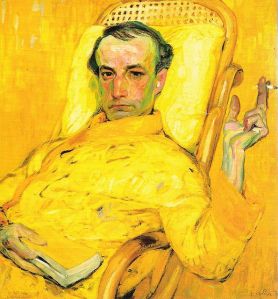
Portrait of the poet by Franz Kupka (1871 – 1957)
OBSESSION
Great forests, like cathedrals you terrify me;
You bellow like organs; and in our damned hearts,
Chambers of everlasting mourning where
Old death rattles resonate,
Replies the echo of your De Profundis.
Ocean, I hate you! Your surgings and tumult
My mind meets them within; this bitter laughter
Of beaten man laced with tears and profanities
I hear it in the vast laughter of the sea.
O’ Night! How you would please me,
Without those stars whose radiance speaks
A language I know only too well!
For I seek the void, darkness, the bare!
But shadows are themselves a canvas
Where, from my eyes, in thousands teeming
with familiar look the vanished beings.
Grands bois, vous m’effrayez comme des cathédrales
LAMENTS OF AN ICARUS
Lovers of whores are happy,
Refreshed and sated;
As for me, my arms are weary
For having embraced clouds.
And it’s thanks to those unrivalled stars,
Who blaze from the sky’s remotest depths,
That my charred eyes see nothing
But the memories of suns.
In vain I sought space,
To know its boundary and heart;
Beneath an impossible eye of fire
I feel my wings buckle then expire;
And seared by the love of beauty,
I’ll not have the sublime honour
Of lending my name to the abyss
That doubles as my tomb.
SPLEEN
Pluvius, riled by the whole city,
Tips from his urn torrents of dismal cold
Over the ghastly tenants of a nearby cemetery,
And on the fog-bound suburbs unrelenting mortality.
My cat, her mangy wasted body ever restless
Crosses the tiles to seek out a litter,
The soul of the old poet roams the gutter
With the woeful refrain of a shivering ghost.
The great bell mourns, and the smoke veiled log
Accompanies in falsetto the snivelling clock,
As from a rankly scented deck of cards,
Fatal legacy of some dropsical old crone,
The smart Jack of Hearts and Queen of Spades
Darkly debate their perished loves.
Pluviôse, irrité contre la ville entière
CONTEMPLATION
Patience, o’ my woe, and calm yourself.
You called for evening, look now, it is falling:
An obscure atmosphere enshrouds the city,
Bringing peace to some, to others worry.
Whilst the vile mass of men, cringing before
The whip of pleasure, that merciless torturer,
Harvests remorse in slavish feasts,
My sorrow, lend your hand; come with me,
Far from them. See the fallen years
Leaning from the balconies of Heaven,
In gowns of a bygone age; and regret, all smiles,
Shooting up from the fountains base;
The dying sun sinking to sleep beneath an arch,
And, like a long shroud trailing from the East,
Listen, dearest, listen for gentle night’s release.
Sois sage, ô ma Douleur, et tiens-toi plus tranquille
THE TASTE FOR OBLIVION
Downcast mind, once amorous for the struggle,
Hope, whose spur would rouse your fervour
No longer even cares to mount! Go down, without dishonour
Old horse, whose foot fails at every fence.
Resign yourself, my heart; and sleep the brute’s sleep.
Vanquished mind, laid waste! For you old marauder
Love has no more relish than a quarrel;
Farewell then, sighs of the flute and songs of brass
Pleasures, seduce no more this sombre brooding heart!
Adored spring has shed its perfume!
Minute by minute now time engulfs me
As the snowy waste a stiffening body;
From on high I contemplate the globe’s roundness
And search no more for the shelter of a hut.
O Avalanche, won’t you take me in your fall?
Charles Baudelaire (1821 1867) was a French poet, translator and critic whose reputation rests primarily on Les Fleurs du mal (1857)), arguably the most important and influential collection of poetry published in Europe during the 19th century. Baudelaire’s translations include works by Edgar Allen Poe and parts of Thomas de Quincey’s Confessions of an English Opium-Eater. He also wrote prophetic essays on art, most notably ‘Salon de 1859’ and ‘Le Peintre de la vie moderne’, and important critical essays on illustrious figures such as Wagner, Hugo, Gautier, Delacroix, collected posthumously as L’Art Romantique (1869).
* * *
From The Rooftops of Paris:
Poems by Rimbaud, Bertrand, and Gautier, translated by Stuart Henson
Introduction
These versions of Nineteenth Century French poets are not presented as ‘translations’, though one or two might pass as such. They want to be living poems in English, so they’re given, now and then, to taking liberties. But they’re keen, too, to be true to their ancestors. They try to follow their forms without being hide-bound. I hope they’ll encourage readers to go back to the originals—and find in them an honest likeness.
*****
Arthur Rimbaud: five poems translated by Stuart Henson
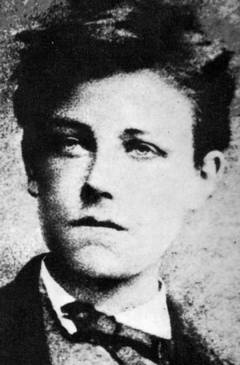
AU CABARET-VERT
Five in the evening
For a week I’d scuffed my shoes in the rough
dust of the highways, walking to Charleroi.
At the Green Man I stopped, asked for a crust—
a ham sandwich—and a mug of Stella.
Stretched out my feet under a green table
and studied the quirks of the pub décor.
And then—almost more than I was able
to bear—the barmaid: huge tits and eyes like stars.
Well, she’d be up for it, no doubt of that!
Look when she brings my sandwich how she pouts,
as if to say I’m yours—and on a plate.
Pink ham and mustard, scented with a clove
of garlic. A frothing pint. It must be love!
Gold sun-rays glinting like the night to come.
Depuis huit jours, j’avais déchiré mes bottines
STATE OF SIEGE
The bus is trundling like some grotesque tank:
poor devil driver threading the Left Bank
bound for the Odéon, his hands frozen
livid, easing the cash-bag off his erection.
Police lurk in soft shadows while inside
the bus the honest passengers regard
the moon rocking her green bed in counter-motion.
So never mind the fragile hour, the prohibition;
relish instead lewd cries of girls with wild hair
howling like cats across the darkening square!
Le pauvre postillon, sous le dais de fer blanc
THE POOR MAN’S REVERIE
There’s a pub maybe
in some forgotten street up North
or on the rolling downs
where I could drink
and die in peace
sunk in the amber light
just nodding patiently.
So when the cash runs out
and healthcare too
it’s perfect loss—
the end of dreams.
Old rambling ghost
that washes up and taps
at the green inn’s door—
finding it shut.
MA BOHÈME
I’m stepping out, hands in my torn pockets,
(Still working the coat for that lived-in look)
Me and Calliope, riding the rocket
of imagined love, the road an open book.
Holes in my only jeans, hooking my thumbs
into my belt and steering by the stars;
singing the sky my songs, pulling out plums
of rhyme for the Pleiades, the Great Bear…
The constellations rustle when you sit alone
crouched in the verge some slow September night
and let the dew soak up and through your bones.
I’ll make my poems from the beat of headlights,
lulled like some Orpheus by the thrum of tyres,
boot-laces plucked against my heart—my lyre
Je m’en allais, les poings dans mes poches crevées
ROOKS
When winter chokes the meadows
watch them wait,
neutral as undertakers,
angels of shadow,
set to sweep in
from the skies on crepe wings.
Ice in their nests,
mud-laden brooks…
Only their dry caarks
creak round the frost’s
ramparts, sifted snow,
dull acres where they come and go.
Flocks wheel the fields of France
perch on each cross—
last season’s dead lost
in their cemeteries. Answer
the traveller then, his memory,
black acolytes of death and duty!
Or spare at least, dark saints
churched in the oaks,
songbirds and larks, shouters of hope—
for those who brace against
wood’s vacancy, horizon’s blast:
men with no future and no past.
Seigneur, quand froide est la prairie
Rimbaud’s libertine sensibility doesn’t rest comfortably in our socially correct era, though over time he has inspired some excellent re-workings. Keith Douglas’s take on ‘Au Cabaret-Vert’ (1940) is but one example. The angelot maudit who produced ‘Ma Bohème’ morphed into a scabrous satirist of establishment figures like François Coppée. ‘State of Siege’ is from the Album Zutique, parodying Coppée but signed A.R. By contrast, ‘Les Corbeaux’, on which ‘Rooks’ is based would seem to be Rimbaud at his most respectable. It was his only poem to be published in France between 1870 and 1882. Rimbaud denied having written it.
*****
Aloysius Bertrand: two poems translated by Stuart Henson
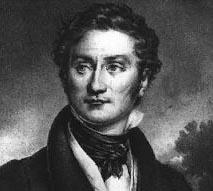
AT DUSK ON THE WATER (BERTRAND)
The coasts where Venice is Queen of the Sea… ANDRÉ CHÉNIER
A black gondola ghosting beneath the palazzos—night’s agent bent
on its mission—stiletto, lantern, cloaked by a cape.
A paramour and his lady, dabbling in love: ‘Perfume of orange-trees
and stars! And you, sweet signora , cool as that statue in the grove!’
‘And this—was that a statue’s kiss, my Giorgio, my sulky brave?
Deny it—you love me! All heaven can see past your pretence!’
A noise? Nothing. Nothing but the pluck of the waves as they rise
and fall on the steps to the Giudecca.
Then: ‘Help me! Oh, help!’ ‘Mother of god! A drowned corpse!’
‘Stand back! He has confessed.’ A monk, there suddenly at the
balustrade…
And the black gondola, sped by its oar, slipping between the
palazzos—night’s agent home from his mission; stiletto, lantern
eclipsed in his cape.
CARNIVAL NIGHT
Mask: lend me your lantern
the stars are blown out.
Mercurio: Hah! Your cat
can see by its own light.
O foolish little gutter-sprite! What made me think I’d hide tonight from the storm in a lantern that hangs at a courtesan’s gate?
At least I can laugh at the bee I hear buzzing about this luminous house, weighed down by a raindrop and trying to get out.
Bedraggled and chilled he comes begging a light for his taper to show him the way to make his escape.
Too late! Now the paper has caught and roars up in flame as a gust shakes the shop signs and batters the street.
Ah! God’s Grace! cries a nun and crosses herself as the fireball takes. Go to hell! I shout back and spit sparks in her face.
Alas for poor me! This morning I dressed like a goldfinch, a miniature doge, in his red and black vestments, his fine robes of state.
Louis ‘Aloysius’ Bertrand died in Paris in 1838 at the age of thirty-three. His fame rests on his sole publication, a book of prose-poems entitled Gaspard de la Nuit (1842). Despite his association with the Romantic movement in French poetry, his ‘fantasies’ of ‘Old Paris’, and ‘The Night and its Marvels’ appealed to Baudelaire, and provided a template ‘to apply to the description of modern life’ in Le Spleen de Paris. He was championed, too, by Mallarmé who declared him to be ‘one of our brothers’, so there’s a direct connection between Bertrand and the poésie des villes of the Symbolists—as well as the ‘art for art’s sake’ of Gautier and the visionary exuberance of Rimbaud
*****
Théophile Gautier: two poems translated by Stuart Henson
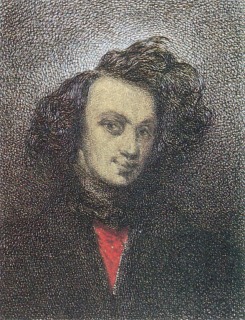
ART
Oh, yes, all the best art
resists your work.
It starts
as a solid marble block.
Its labour of despair
insists, if you can hack it,
you wear
the Muses’ tight strait-jacket.
Free verse? Why, shame on you!
That old commodious boot—
glass shoe
for every Cinderella’s foot!
Sculpture won’t work in plasticine;
soft thumbs, however much you will it,
though keen
can’t make the marks of real spirit.
Remember Michelangelo: Carrara’s
best his medium of choice,
its rare
silence shaping-out his voice.
You need the truest hand
to trace a vein of agate, follow
and find
the lost profile of Apollo
or steal from Syracuse
a bronze-age hoard
and use
it to re-cast your words.
Painter, don’t dabble water-wash,
stains of green weed and muddy gravel,
that mush,
but fire instead the forged enamel.
Make sirens ground from azurite
each with a hundred peacock eyes.
Frighten
yourself with griffon’s cries
and draw the haloed Virgin’s crown,
her blue enfolding robe;
the Son
Salvator Mundi, with his globe.
All things will pass. Only tough art,
the perfect bust, speaks to eternity,
outlasts
its time, outlives its city.
Rome’s emperors whose bones
are gone, whose robes are dust,
strive on:
their brows on buried coins don’t rust.
All the old gods are done, yet scribes
in their immortal lines kept them
alive
where art is sovereign.
So chip away. Never give up.
Cough, grapple, hammer your block
and trust
in the recalcitrance of rock.
GARRET
Low on the tiles a tomcat,
stalking the birds at the bath
on my balcony. Beyond, a garret
that for the sake of art
is framed exactly by two soil-pipes.
If I wanted to please I suppose
I’d place a vase right there
in the window, full of sweet-peas.
And picture for you Roxette
striking a pose with a brush
in her speckled mirror that reflects
a world of not-quite-enough.
Or Margy in just bra and pants
leaning out into the sun
with a bottle she decants
in slow dribbles on her pot-geranium.
Or the young poet maybe
who numbers anxiously his dry syllabics
to please his prof, earn his degree,
and scans for a theme the rooftops of Paris…
Sadly, the true view’s more prosaic:
no vines on the window-frame,
just rot, flaked paint and a mosaic
of soot that deckles the panes.
For your tart, your artist,
waitress, waiter, widower
there’s no charm in being piss-
poor, the opera’s tragic character.
One time there might have been
room here for love on a horse-hair
bed below the tiles—a dream
quick-breathing up the narrow stair.
But romance needs its mise-en-scene:
some central-heating and silk sheets,
four-poster luxury, thick carpet when
you step out to the tiled en-suite.
And now at night the prospect’s black.
Roxette’s out late, gone dirty-dancing;
and Margy won’t be stumbling back
before the sun comes glancing in.
A while since, the poet gave up on
his soaring for the perfect line,
became a hack. Bored then, he traded-in
Parnassus for an office and a mezzanine.
But still this view is all I’ve got:
my window-on-the-world, something
to watch: one lean old woman and the cat
she teases idly with a ball of string.
Théophile Gautier was also a journalist, travel writer and art critic. He tried his hand at novels plays and ballets too—most notably the scenario for Giselle. His friends included Victor Hugo and Gérard de Nerval. For a while, after the 1830 Revolution, he lived the bohemian life in the Paris suburbs but by 1862 he was established enough to be elected Chairman of the Société Nationale des Beaux-Arts. Art, he declared, famously, n’est pas le moyen, mais le but.
* * *
José-Maria de Hérédia: Three poems translated by David Malcolm
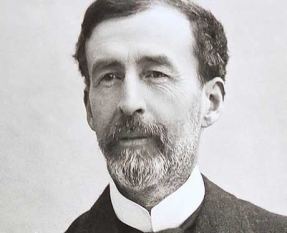
TREBBIA
Dawn of an ominous day has bleached the higher ground.
The camp wakes up. Down there, the river thunders and groans
Where the horses drink of the light Numidians.
Everywhere the buccinators’ clear call sounds.
For despite Scipio, the lying augurs,
The Trebbia in flood, despite wind, despite rain,
Sempronius, Consul, dreams new glory once again,
Commands the fasces raised, marches out the lictors.
Reddening an obsidian sky with baleful blazes,
On the horizon burn Insubri villages.
Far off you hear the trumpet of an elephant,
And down there, under the bridge, back against the arch,
Hannibal was listening, passive and triumphant,
To the dull tramp of the legions as they march.
L’aube d’un jour sinistre a blanchi les hauteurs
EVENING OF BATTLE
O happy horse, to bear the weight of Antony – Shakespeare
The clash had been most fierce. The tribunes
And the centurions, rallying the cohorts,
Still drew in the air vibrating with their hard words,
The heat of carnage and its acrid perfumes.
With dismal eye, counting their dead companions,
The soldiers watched how, as wind with dead leaves plays,
Far off eddied the archers of Phraortes;
And from their brown faces the sweat ran down.
It’s then that there appeared, with arrows bristling,
The vermillion flux from his fresh wounds glistening,
Beneath purple flows and bronze gleams,
To the din of buccinas sounding a fanfare,
Superb, mastering his rampant horse affeared,
On a sky in flames, the Emperor in bloody streams.
THE CONQUERORS
As a flight of gyrfalcons round their charnel-house scream,
Weary of bearing their haughty miseries,
De Palos, de Moguer, captains and mercenaries,
Departed, drunk of a heroic, brutal dream.
They were going to gain the fabulous metal yield
That Cipango ripened in his distant mines,
And as the trade-winds blew their antennae inclined
To the mysterious shores of the western world.
Each evening, wishing for tomorrows from epics,
Azure phosphorescent of the sea of the Tropics
Their sleep in a gilded mirage would drown;
Or, in white caravels leaning forwards,
They saw rising high into a sky unknown
From the Ocean’s furthest deeps new stars.
Comme un vol de gerfauts hors du charnier natal
José-Maria de Hérédia (1842-1905) was of Spanish and French ancestry and spent most of his life in France. He was closely associated with Leconte de Lisle and the Parnassians, and almost his entire output consists of 118 sonnets collected in Les Trophées (1893). The poems attempt to capture central moments of human history with rigorous attention to the form chosen and a somewhat recherché language. He was a member of the Académie française.
* * *
PART TWO: AFTER 1900
Rainer Maria Rilke: a poem translated from French by Will Stone
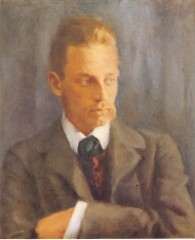
NIGHTINGALE
To Mademoiselle Contat
Nightingale…, whose heart
Shines past the others,
Priest of love, whose cult
Is a cult of passion,
O’ sweet troubadour
Of the night that haunts you,
You embroider a ringing ladder
Upon its velvet abyss.
You are the voice of saps
That in trees stays silent;
But to us, your students, Nightingale,
You consign the same secret.
From ‘Suites Brèves’ – ‘Le Petit Cahier’ 1922
Rainer Maria Rilke (1875 – 1926) was an Austro-German poet born in Prague, a city he was at pains to relinquish. Only the city of Paris remained a stable presence for Rilke, his greatest lesson and most favoured creative terrain until the upheaval of the First World War. Rilke’s serial journeying was spiritually driven, his chosen mode of life one of necessary displacement with France, Italy and Switzerland providing the gilded sanctuaries which would enable this searching and meticulously sceptical poet the stretches of solitude he required to properly read his delicate existential seismograph and gain purchase on his inwardness. Though Rilke’s international reputation famously rests on the Duino Elegies and Sonnets to Orpheus (1923), his value to future generations is far more expansive, most notably in the vast and rich correspondence he assiduously curated.
* * *
Francis Jammes: ten poems translated by David Malcolm
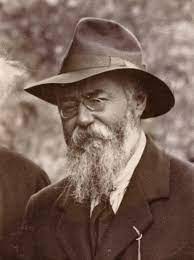
From : De L’Angelus de l’aube à l’Angelus du soir
IT WILL SNOW NOW . . .
To Léopold Bauby
It will snow now in some days. I recall
last year. I recall my sadnesses
by the fire. If I’d been asked what it is,
I’d have said: leave me be. Nothing at all.
I thought a lot, last year, in my room,
while outside the heavy snow came down.
I thought for nothing. Now as then,
I smoke a wooden pipe with amber stem.
My old oak dresser smells as good as new.
But I was dull, for things like these
could not change and since it is a pose
to wish to chase the things we know.
Why then do we speak and think? It’s weird;
Our tears, our kisses, flow from speechless lips,
Yet still we understand them and the steps
of a friend are sweeter than sweet words.
We have baptized the stars without a thought
that they have no need of names; the digits
that prove in the dark the lovely comets
will pass, will not compel them, not a bit.
And even now, where are my old sadnesses
of last year? I scarcely can recall.
I’d say: leave me be. It’s nothing at all.
If you came to my room as asked what it is.
OVER THERE, THERE IS . . .
Over there, there is an old chateau, sad and grey
like my heart, where when the rain comes down
in the empty courtyard the poppies bow,
deflowered, rotting under the water’s weight.
Betimes, no doubt, the iron gate stood open
and in the house, old and bent, they hugged the heat
beside a screen edged with green ribbon
where the four seasons stood coloured bright.
The Percivals, the Demonvilles were announced,
who’d arrived, in their cars, from the town.
And in the old salon of a sudden gay
the old folk exchanged civilities.
Then the children ran off for hide-and-seek
or to look for eggs. Then in the chill rooms
came back to see the grand portraits’ eyes all dim
or where strange shells lay on the mantelpiece.
All this time the old parents murmured on
about a grandson, his portrait done in oil,
saying: “He died of a fever – typhoid –
at school. How he suited his uniform!”
His mother, who lived on, recalled again
her son died near the time of holidays
when the thick leaves hung and waved
in the great heats where fresh streams ran.
“Poor child!” – she said – “he loved his mother so,
he was never bothersome, no.”
And she wept still recalling again
that poor son, simple, good, dead at seven.
Now the mother’s dead too. Sad, isn’t it?
It’s sad like my heart as the rain comes down
and like this gate where the pink poppies bow,
glistening, rotting under the water’s weight.
THE CRANES
The cranes have passed down the grey sky, their cry grates
as the long lines file, cries of snow and shades;
the season’s come to decorate the graves.
The wretched, the blind, they’ll be beggars
with their hands red and shiny. They’ll stagger
to die on dark nights shivering in laughter.
The beasts will suffer. I saw someone begging,
an old man with cloths on his eyes, beating
his poor dog, tail to its belly, trembling.
He dragged it, choking it with a rope,
said: “Threw him three times in the water. The rope
broke. He comes back, the pig!” And the rope
dragged. The old dog, comrade in misery,
seemed to say to the old man: “Leave me be
still to cling to your clothes ragged and dusty.”
He, being man, worse than the dog, screeching:
“Pig! Pig! Next time I’ll drown you for certain . . . ,”
they went on both ’neath a great sky of tin.
THE YOUNG GIRL
To Stéphane Mallarmé
The young girl is white,
she has green veins
on her wrists, her sleeves sit
open.
You don’t know why
she laughs. In passing
when she cries
it’s piercing.
Does she have no faith
she’ll take your heart for hers
picking by the path
some flowers?
You’d guess here and now
she knows how it is.
Not always. Her voice goes
all low.
“Oh! My dear! Oolala. . .
. . . Imagine . . . Tuesday
I saw him . . . I laughed,” she says
like that.
When a young man suffers,
at first she’s silent,
has no more laughter,
just wonderment.
Down the little lanes
she fills her hands
with briar thorns,
with bracken.
She is big, she is white,
her arms are sweet.
She stands quite straight and arcs
her neck.
WHY DO THE OXEN . . . ?
Why do the oxen drag those heavy carts?
It’s piteous to see where their great heads swell,
eyes that seem to know the pain of all the fall.
They earn the peasants’ bread when times are hard.
Veterinaries, if they can walk no more
sear them with drugs and branding irons red.
And then in the fields full of poppies red,
the oxen harrow the earth as before.
One will break a leg, well, now and then.
They’ll kill him for the butcher meat
poor ox who heard the cricket greet,
obedient to the harsh commands of men,
the peasants who harrow in the sun’s mad stare,
poor ox who went he knew not where.
THESE ARE THE WORKS . . .
These are the works of man that are great:
that which pours the milk in wooden vats,
that which picks the ears of corn sharp and straight,
that which guards cows where the cool alder arches,
that which bleeds the forest’s birches,
that which twists osiers where bright streams pass,
that which mends the old worn shoes
by a humble hearth where an old cat scratches,
a blackbird sleeps, and with some happy kids;
that which weaves and clacks continually,
till midnight the crickets sing acerbically;
that which makes the bread, that which makes the wine,
that which sows the garlic and kale in the garden,
that which gathers the still warm eggs.
THERE WERE GLASS JUGS . . .
There were glass jugs of clear water
in the dark little garden of the Protestant minister
at his house with its severe air
and thick glasses, too, were there
on the cloth. Leaves lay against the windows’ shutters.
The month of June. On the narrow path
a piece of fishing rod, made from reed, broken small,
had been cast out, the day was both
grey and, as they say, right close,
like when great drops of rain are sure to fall.
By the dark window, sad, open
you heard a piano where the laurel glints.
The little windows were green.
There you should be happy, for certain,
like in books by Rousseau long time since.
THE LITTLE DOVES . . .
The little doves of the conjurer,
the little dove and his little sister,
suffer each day, it’s easy to tell,
in the little box in the hotel
and then again when evening comes,
And they’re there up the sleeve of the black costume,
and when they come out into the light
as is the show’s custom every night.
I SMOKED MY CLAY PIPE . . .
I smoked my clay pipe and saw the cattle,
yoke bar in front and slobbering muzzle,
resist the peasants, poking their backs
above the horns – and I saw, sweet flock,
the bushy ewes pass by on feeble legs.
The good dog feigned to be in rage,
and the shepherd cried: Wolf! Here! Wolf! Come!
And the happy dog gamboled up to him
and bit his crook quite facetiously
under the calm of a warm rainy sky.
WE SAY AT CHRISTMAS
To Mademoiselle M.R.
We say at Christmas, in the byres, at midnight
ass and ox in holy shadow chat.
I believe it. Why not? So, night scintillates:
star roses stay a station of the cross.
Through the year ass and ox know their secret.
We’ve no doubt. But me, I know each holds
a great mystery in their humble heads.
Their eyes and mine speak clearly each to each.
They are friends of the fields, great and gleaming,
where the slim sky-blue flax flowers grow trembling
beside the marguerites whose Sunday’s set
every day since they’re dressed in white.
They are friends to the crickets with great heads
who sing a sort of little mass,
so delicate, their gold buttons the bells
and the clover flowers the tapers blest.
Ass and ox say nothing at all of it,
being of a grand simplicity
and knowing well that all the verities
are not good to tell of. Far from that.
But I, when it’s Summer, the bees that sting
fly like small fragments of the sun,
I pity the little ass and wish they’d give
him small cloth breeches of some coarse weave.
And I want the ox who, too, knows the Good God
to have between his horns a fresh bouquet of fern
to save his poor and sorrowful head
from the fierce heat that makes the fever burn.
Francis Jammes (1868-1938) was a rural and religious poet, closely associated all his life with the regions near the Pyrenées. Because he was a rustic and religious poet using a relatively simple language and traditional forms, his success in the French literary world is seen as remarkable. Yet he counted Stéphane Mallarmé and André Gide among his admirers.
* * *
Oscar V. de L. Milosz: four poems translated by David Malcolm
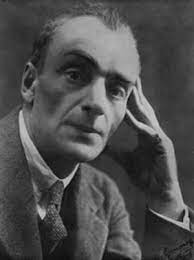
SPRING CANTICLE
Spring has come back from his far voyages,
He brings us peace of heart.
Get up, dear head! Fair face, raise your eyes!
The mountain is an isle in the midst of haze; once more she is laughingly coloured.
Oh youth! Oh from the house the guelder roses hang!
Oh season of the wasp prodigious!
Summer’s crazy virgin
In the heat hums serenades.
All is trust, charm, repose.
The world is gorgeous, my beloved, the world is gorgeous!
A grave and pure cloud has come from an obscure realm.
On the gold of midday love’s silence has fallen.
Nettles bend their ripe heads in drowsy dream
Under the lovely crown of Judea’s queen.
Do you hear? Here’s the rain.
It’s come. . . . It’s poured down.
The water’s surface makes all love’s realm smell sweet.
The young bee’s here,
The sun’s daughter,
Flies to discover the mysteries of the orchard;
I hear the flocks bleat;
The echo answers the shepherd.
The world is great, my beloved, the world is great!
We’ll seek abandoned places where the pipes are heard.
Down there, at the tower’s foot, in the cloud’s shade
Sweet rosemary counsels sleep; and nothing has charm
Like the ewe’s infant, the colour of day.
From the veiled hill the tender moment sends us word.
Arise, proud love, lean on my arm.
I’ll part the willow’s leafy forms
We’ll look into the valley
The flower hangs, the tree quivers; they are drunk on scents.
Already, already, the corn is there,
Like sleepers’ dreams rising in silence.
My great sister, love power-girt,
Let’s run to where the bird calls us hidden in the gardens
Come, cruel heart,
Come, sweet face;
The breezes with child’s cheeks toss
Clouds of jasmine.
With fine feet she comes to drink at the fountain, the dove;
How white she is in the new water, see!
What does she say? where is she?
You’d say she sings in my new heart.
There she is far off. . . .
The world is great, best-beloved, the world is great!
The woman of the ruins calls me from a skylight:
See how her hair of crazy flowers, of wind
Has spread where the crumbling eaves end
And I hear the striped bumble bee,
Old bugler of days once innocent.
The time has come, crazy head, for us both,
To deck us with berries that breathe in the shade.
The oriole sings down the most secret path.
Oh my thought’s sister! What is this mystery?
Enlighten me, wake me, for these are things seen in dream.
Oh, I’m asleep, sure enough.
How life is grand! No more lies, no more grief
And flowers rise from the earth
Who are as if the dead forgive.
Oh month of love, oh voyageur, oh day of joy!
Be our host; stay;
Under our roof you’ll rest peacefully.
Your grave projects will doze off in the winged murmur of the avenue.
With bread, with honey, with milk we’ll feed you.
Don’t fear,
What do you have to do down there?
Aren’t you happy here?
We’ll hide you from all care.
There is a lovely secret room
In our house of rest;
There, through the open window green shadows come
Onto a garden of water, solitude, and gracefulness.
He listens . . . he pauses some . . .
How the world is blessed, my beloved, how the world is blessed!
THE BERLINE STOPPED IN THE NIGHT
Awaiting the keys
xxxxxx– He’s looking for them doubtless
In the garments
Of Thècle dead thirty years since –
Listen, Madame, listen to the old, the deaf murmur
Of night in the avenue. . .
So little and so weak in my coat wrapped so,
I’ll carry you through the thorns and the nettles of the ruins right to the high, black door
Of the chateau.
It is thus the grandsire, once, returned
From Vercelli with herself no more.
What a house, so mute, mistrusting, black
For my child!
You know it already, Madame, a tale so dark.
They sleep scattered in far countries.
A hundred years since
Their place waited once
Deep in the hilly lands.
With me their race ends
O Lady of these ruins!
We will see the lovely room of infancy: there,
The supernatural depth of the silence
Is the voice of the portraits obscure.
Curled up on my couch, in the night,
I heard, as in the hollow of some armour,
In the sound behind the wall of the thaw’s stir,
Their hearts’ jar.
For my fearful child a homeland so savage!
The lantern goes out, the moon slips through the haze,
The screech owl calls to her daughters in the boscage.
Awaiting the keys
Sleep a little, Madame – Sleep, my poor child, sleep
All pale, head on my shoulder.
You’ll see how the uneasy forest
Is beautiful in the insomnias of June, embroidered
In flowers, o my child, like the daughter preferred
Of the mad queen.
Wrap yourself in my travelling coat:
On your face the great snows of autumn melt
And you are drowsy.
(In the lantern’s beam she turns, turns with the wind
As in my childhood dreams she turned
The old woman – you know – the old woman.)
No, Madame, not a sound.
He is quite aged,
His mind deranged.
I wager he’s gone for a drink.
For my fearful child a house black like ink!
Deep, deep, Lithuanian lands lie around.
No, Madame, not a sound.
House black, black.
Locks rusted.
Vines dead.
Doors bolted.
Shutters closed.
Leaves on leaves for a hundred years where the avenues go.
All the servants are dead.
I – I’ve lost my memory.
For the trustful child a house so black!
I remember only the orangery,
The great-great-grandmother’s, and the theatre.
The owl’s young ate there from my hand.
The moon peered through the jasmine.
That was once.
I hear a footfall where the avenue lies.
Shadow. Here’s Witold with the keys.
MISTS
I am a great November garden, a garden of tears
Where the outcasts shiver from of the old quartier;
Where the fogs’ wretched colour says: Always!
Where the fountains’ patter is forever Nevers. . . .
xxxxx– Around a ridiculous meditating bust,
(Marie, you’re asleep, your mill’s turning too fast),
Where the round turns of the old quartier’s despairs.
Do you hear the round that weeps in the garden drowned
In blind mist, deep in the old quartier?
Poor dead friendships’, burlesque forgotten loves’ sound,
Oh, you, lies of an evening, oh, you, illusions of a day.
Around a ridiculous meditating bust,
(Marie, you’re asleep, your mill’s turning too fast),
Come dance the black round of the old quartier.
The mist has eaten all, nothing’s gay, nothing grieves,
A dream is as hollow as the real.
But in the park where you knew summer’s feel
The round, the immense round turns, turns always,
Friends you replace, lovers you leave
(Marie, your mill’s turning too fast, you’re asleep. . . .)
I am a great November garden, deep in the old quartier.
THE CHANT OF THE CHEVALIER ZYNDRAM
Like joy’s or alarm’s fires
On night’s mountains, the wakening scream
Of the eagle of the solitudes
Or middays on the haffs, colour of tears
The cold light of dreams.
So let it be you, young soul in dazzling ascents,
Imperial virgin elated
Of chants, wines, cruel laughing suns’ heat;
Barbarian goddess, sweet and terrible, the incense
Of future crowds, darkened with tears and sweat.
My heart, under the rotten leaves of dead years past,
In the mud of roads forgotten,
Sleep the bleached bones of loves and friends
The worst and the best.
We are like stones to the lake bottom thrown,
Like leprous pariahs among men,
Like bread with pity poisoned.
Shame has spat on our blazon.
Like the old bald crows for which the horizon
Is shelter for winter, and the flesh of bodies a nest,
So the days of life are lonely throes of dying nights.
xxxxx– Like the yellowing leaves’ flight
In the red winds of autumn sunsets sounds the same
As your name.
But blood enough is left to stain the banner,
But a string still quivers on the rusted lute
Which will know how to weep and cry out
The great poem of injustice and hunger,
And this old epée gnawed by the moon
Still recalls the poor man,
The widow and the orphan.
A glance for our good old chateau of misery,
An orison for the worm-eaten cross
Where the road forks,
Nothingness in the heart, eyes burnt by the black north wind,
The rusty beard the smell retains
Of a bitter wine,
Let us go down towards life; she will tell us where duties begin.
As long as there’s still hope for adoration or belief,
A barrel or two of wine to quaff,
The lean knight Zyndram is not lost.
For the worst fate is more lovely than the waves!
If you weep or laugh by the empty graveside
Of your heart; if you fear your hands – a parricide’s –
And if the bleeding fingers of the cold Eumenides
With disgust have cut the harp of your nerves,
Arise, the air is young, the water rings as the winds fly
And the joys of long ago sigh in the echo.
Gird yourself with love for those whom you despise:
The moon is yours, how could she not be lovely so?
Revive, and on the Rhine of grey tears
May the dazzling swan and the white device
Tell the of the hero’s return at the last!
Like the moment of the pillar of sand in the desert,
Like the cry of the lightning that falls seaward,
May each of your moments be, my soul
Of bard and knight,
Henceforth.
xxxxx– The trumpets call, the tail of flames
Of the mountains affrights down there the barbarous night. . . .
Yes, yes! There still remains something for us to love!
Oscar Vladislas de Lubicz Milosz (1877-1939) was born in what is now Belarus of Lithuanian, Polish, and Jewish ancestry. From his teens he lived and studied in France. An accomplished polyglot, he identified himself with the newly independent Lithuania after the Great War. He wrote verse, fiction, and drama in French. His writing is seen as esoteric, metaphysical, and rhapsodic. The Nobel prize-winner Czesław Miłosz is a relation.
* * *
Robert Desnos: Daniel’s Geometry: four poems translated by Timothy Adès

For the son of the composer Darius Milhaud, 1939
THROUGH ANY POINT ON A PLANE
Through any point on a plane
You can pass only one line perpendicular to the plane.
So they say…
But through all the points on my plane
You can pass all the people and animals on earth
So your perpendicular makes me laugh.
And not just people and animals
But plenty besides
Pebbles
Flowers
Clouds
My father and mother
A sailing-boat
A stovepipe
And if I choose
Four hundred million perpendiculars.
MOEBIUS RING
This round-returning road I run
xxxxWon’t be the same when I’m half-done.
No use my going straight ahead,
xxxxIt takes me somewhere else instead.
I go right round but the heavens change.
I was a youngster yesterday
xxxxI’m a man today
xxxxThe world is strange.
A rose that grows in rosy rows
Is not like any other rose.
THE ANGLE SUBTENDED…
The angle subtended…
One moment, what angle?
I don’t want to know
If it isn’t the angle
The one where I’m grounded
To count to one hundred
Before shouting GO!
You strangle me, angle,
Engulfed and surrounded.
La Belle Angleterre
Not Angles but angels
Fair England of legend.
My eyes are shut tight,
My night has descended.
The angle subtended…
THE PARABOLA
Parabola hey! my nanna
Parabola bored in its cage
Rather be on the branch
xxxxBranch too low
xxxxSun too high
I watch birds fly
To earth, to sky
xxxxBranch too low
xxxxSun too high
Funny birds
Nest far from earth
xxxxBranch too low
xxxxSun too high
Robert Desnos (1900-45) was hailed as ‘the prophet of Surrealism’ – ‘Words have stopped playing: words are making love’: so said André Breton. He took Surrealism out into the world, on radio, in films, in journalism. He was close to Duchamp, Prévert, Alejo Charpentier. His hundred poems for children were late works, as were his great sequences against the Occupation. He was an active Resistant, a martyr who died in the Nazi camp of Terezin.
* * *
Marie-Claire Bancquart : twelve poems translated by Anna Gier
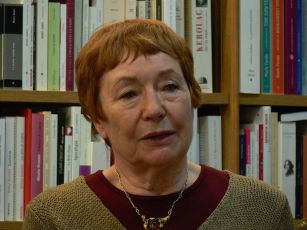
From Qui vient de loin (Pantin: Le Castor Astral, 2016)
… Foot upon a step
sixty years gone by.
A snagging
Of sensations that were pretending to be dead.
The staircase suddenly overruns
with uncles, neighbors, missing cats
a whole lifetime ascending
towards memories familiar enough to be present
but this is no longer the same staircase
the other was destroyed with the house.
Now they’re putting up a big shopping center over there,
and one must be very old to remember these bygone places,
nowadays more distant than the moon.
*
There are wounded words
at the door
don’t open it
they’re stacked up, they’d collapse in a heap
some keep climbing the stairs
they’re seeking
perhaps
silence. Their silence.
If you opened the door
they would enter the dictionaries
they would occupy those quiet
alphabetized domiciles, where nothing shows
that true horror does exist
but blood
would flow from them
each time we reached the word Blood.
*
Pollution over the city.
Weave of evenings
in confused greys.
We would like to grant a charter to the wild roses
so they may climb up
all the balconies
cultivating worship
of impalpable purity.
*
Is it possible for us to
delight or distress stone?
With the attention we give so partially
to the living
who are we before the apparently inert?
— Our palm against an old wall,
we believed we only touched the unfeeling.
The mineral warms under our flesh
begins an existence, barely perceptible:
tiny mosses, furtive creatures.
A very faint call to share in
a secret life
reaches us from the depths of time:
the stone exudes a bit of moisture, like a tear.
… Subtlety of obscurity, sometimes.
*
With each spring a new bud opens
into sweetened blonde leaves on the branch
would that I could metamorphose
from woman into horse
so I could reach
with my lofty lips
one of those flames of honey!
*
We have no interest
in paying full price for your catalogue of anxieties
shouldering the fall of the gods
lowering our voices over headlines, conspiracies.
We refuse the mass embarkation
towards shipwreck.
We withdraw to our domain
though narrow
like the flanks of the whale were for Jonah
still liveable:
a thistle’s capitulum
closed
over a bee.
*
The ark and the axis:
these harmonies devoted to the cosmos
must be recovered within us
quite simply
because all that exists cries out and thinks.
Ark, our resonant dwelling in common.
Polyphony of beasts
caged two by two,
rustling,
even the butterfly and the blessed ladybug.
Thus reverberates our heart
and our vertebrae
their architecture so fragile
are the axis of our fleeting higher thinking
which we recover drafted
in the fish of the deep.
*
I retire to you as if to an island
inhabited by music and words
but alone
amidst a speechless sea
an island
that can move that can love
that in itself is enough.
*
Write
for the stranger who’ll read this
in a room
that I’ve never seen?
To meet each other
would be indiscretion;
the two of us are nearing our outset in things
in them
we will find an inexhaustible exchange
and the words will dry out in an attic somewhere
on the earth
which we will have
forgotten.
*
We will work on the possibilities
of our existence.
… Our application to our own life
is very white in color
on it
music
awaits notation
a poem is hesitating.
It may be worth furthering
like antimony
on its way
to the alchemists’ gold.
*
And what, mage of expectancy
casting under dizzy spells
abruptly
interrupted
then taken up by
the charm of the seasons, the conflagration of faces,
the very name of life
tolls for thee like a flash of hot energy…
*
The place of the poet?
— An undeserted island
a solitude widely shared
peopled with intermediaries,
metamorphoses,
houses
with
walls full of
portraits of strangers we would’ve wildly loved.
Marie-Claire Bancquart (1932–2019) was a prolific poet, novelist, and academic whose literary and critical contributions to the Francophonie have been widely recognized, including by the Académie Française with the 2001 Grand prix de la critique littéraire. Confined to a full-body cast for prolonged periods of time as a child due to bone tuberculosis, Bancquart’s experience of subjecthood was shaped by an acute awareness of physicality and an appreciation for material existence as a ‘community’ of all matter intermingled in changeable configurations. Qui vient de loin, the 2016 collection from which the translated excerpts are taken, gives full expression to her philosophically atomistic worldview and the appetite for life it accommodates, celebrating fragility and finitude as the terms of humanity’s participation in the cosmos.
* * *
George Goddard: three poems translated from his own St Lucian Kweyol

MORNING COFFEE
Morning coffee
takes me back to the archives of my childhood
my grandmother,
her dibélwé constant as her morning prayers
brewing café noir
from home-grown coffee beans;
waking me at 5
When the feisty scramble for mango la rose,
mango dou-i-dou
had ended with their season
and there was no reason to jump out of bed
but a little sip of ground coffee
This morning
there’s Nescafé in my teacup.
HILLS…
Hills are rising, then climbing down
under the beauty
of the sun’s crown;
hills are rising, then climbing down,
sun dries up the land as
your leaving shrivels my soul
Hills are rising and climbing down slowly
trying to comprehend
an intimacy at an end
suddenly
Mountains tumble down
leap high to touch clouds;
the rain-season’s clouds
cry a flood
for a love that is gone,
dispersed
In the air like a mist;
and still within me I insist
you will return,
return in the end…
yet hills fly high
dive down with the wind from the sea;
wind blows dry leaves
to fall from the trees
scattering these
in many shards of my heart, abroad.
EN BAS LA TERRE
I will never understand
why you search
So many times you had found it
(so I thought)
yet you search
And you don’t say “love” or “truth” –
you do not;
you would admit you search
“En bas la terre pas ni plaisir”
grand aïeuil-nous dire, alors jeune homme
faire plaisir-‘ous ici:
life’s a frenzied season, transient,
that ends in an amnesiac lent
so laugh and fête
Run and laugh and fête
cry now and then
but do not search!
Yet it may well be
that in the unfettered season you have
xxxxxxxwilled your life to be
unwittingly you search
George Goddard is a Saint Lucian writer and poet who published his first collection, Interstice, in 2016. He writes both in English and Saint Lucian French Kwéyòl. He is currently putting together two other collections. His work has been published in Caribbean and international magazines (on-line and print). Among these are BIM: Arts for the 21st Century (2021, 2020 & 2017), Interviewing The Caribbean (2020, 2017), Re-Markings (2021), The Caribbean Writer (2021 & 2017), Punch (2018) and The Missing Slate (2015).
* * *
Gilles Ortlieb: Four poems and a prose translated by Stephen Romer
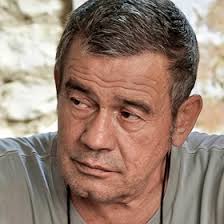
BROUILLARD JOURNALIER (Obsidiane, Paris, 1984)
A zinc roof laid bare
through the broken, dented snow :
first inklings, bitterness recouped,
the streets still untempting
and the quayside, stiffened trees.
Not so long ago
a penny whistle could topple cathedrals
—winter glimpsed, through the thousand
declensions of thought. And the weary kiss
that ivy lays upon the waters,
light thrown up on the bridges
and on all of us, from the poorer quarters,
veterans of seasons past.
ABSURDE DE S’OBSTINER
Absurd to trudge on like this
against the oozing wind of fixed
winters. Experience teaches you to scarper quick
when your steps freeze under rags of storm.
There’s a pocket knife, for the day’s rations,
papers scattered round the sleeper and the certitude
—recognized on waking—
nothing will absolve him from his headlong flight.
À NOUVEAU, LA CHASSE
Once again, it’s the sardonic but stubborn
quest, floated along the streets. Pencil, tobacco
and book, the requisite paraphernalia,
until writing wearies, and being alone
with one’s own verses.
Then hunger calls, to appease itself,
and I’m drawn to the lights for a bit of warmth.
I watch the pedestrians file by
their washed-out gaiety, eternally played out
and a voice at my shoulder
‘alas, you doubt everything, and yourself…’
QUE LA RUE
So let the street be my addiction,
the acrid vapours over the termini
the intermittent spitting of the storm :
the summer’s allotment, and slow afternoons
where I walk, trapped in a cipher of footsteps,
to watch the barges disappear under the arches
and smoke my endless, thin cigarettes
to bring these syllables to the surface.
An isolated quotation, penned in a margin :
‘The writer’s best work, and it is the same with any craftsman, comes once the first weariness has been overcome’. My poem on Hagondange would be an example of this : I have never written it, even though every time I pass the place on the train its ghost or the desire to write of it revives, but this is as quickly discouraged by my incapacity to describe the dullness of the place. Which in turn is to ask, once more, the age-old question : is the lack primarily mine, which is then imposed, forcibly, on a landscape that is not to blame but still… or does it indeed emanate from the sight of those over-straight main streets and the adjoining suburbs with their shuttered windows, which transmits lassitude to the eye regarding it, without its knowledge ? (One day, though, I shall get off at Hagondange and I shall walk up the main street long enough to approach the idea of what I had come for, before turning back, and taking refuge in then only restaurant open near the station, Au Pavillon d’Alsace, where for forty-nine francs drink included I can regale myself with a sclerotic-looking choucroute. And the bread will taste a tad acidic in the basket as they unroll the green baize in the public bar, and a retired unionist will sing out ‘Bonjour, belle enfant !’ in reply to the ‘Salut, Lucien !’ proffered by the amenable over-blonde waitress, and a ray of light, as if refracted through stain glass, will strike my beer mug, and then I shall be able to say that, for an instant, the lack is indeed in the eye that observes and not in the object observed.)
Extract from ‘Notes de février sur la neige et l’immobilité’, La nuit de Moyeuvre (2000).
Gilles Ortlieb (b 1953) has become, over the years, a familiar name to readers of modern French poetry in translation. He has been published in anthologies and reviews, in translations by Jennie Feldman, Patrick McGuinness and Stephen Romer. Ortlieb tends to be classed among the poètes du quotidien, or the poets of daily life, a term that is really redundant in any tradition other than the French, where the notion descends from ancient quarrels. But Gilles Ortlieb, essentially by amassing details of outer phenomena, subtly matched by an inner necessity or pressure that is more felt than stated, has made le quotidien all his own. The themes in the intense, laconic early poems given here remain essentially the same, though they are amplified in the later work. Ortlieb has also written biographies of Baudelaire (his last spectral years in Paris – Au Grand Miroir (2005)) and of a little-known Portuguese poet and visionary who ended his days in a mental hospital, Angelô de Lima (Angelô, 2018). In these, Ortlieb invites the reader into the biographical process itself, subtly weaving into the writing his own responses to things and places encountered along the way.
* * *
Maram Al-Masri: ten poems translated by Hélène Cardona
From The Abduction (Le Rapt, Éditions Bruno Doucey 2015)
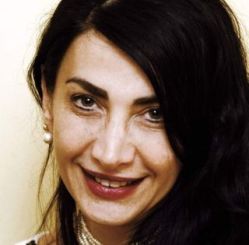
WE SOW
We sow
she sprouts
she grows
she hurts
she explodes
she gives birth
to an infant in a poem
Between her thighs
it flows
like a waterfall
a small body
naked
warm
he cries,
I am here
COME ON, SUN
Come on, sun
wake up!
Let your yellow hair float
over the cold shoulders of the earth,
over the houses and the streets.
Heat up stones and asphalt –
dance, sun, ablaze!
Make this this day a beautiful day,
because far from this cold wall
in a field of colors
where the sky is made of tales
and where the trees are poems
I will take my little one for a walk.
DANCE, DANCE
Dance, dance
my son
because you were born
to teach the birds
to fly
dance, dance
my son
so that the restless heart of the world
may calm itself
to the rhythm of your steps
dance, dance my son
so you may learn to fly
PROMISE ME
Promise me
if I close my eyes
you will run into my arms
to light up
this dark world
Promise me
if I open my eyes
you will stay
FORGIVE ME, MY LITTLE ONE
Forgive me, my little one
if I didn’t come quickly
on foot, the path is long
and I couldn’t afford the tickets
forgive me, my little one
this excuse
must seem feeble to you
surely
I could come on foot
or borrow the money
or save some money
stop smoking
(though I don’t smoke)
or even sell my mother’s jewels
to buy the tickets
forgive them, my little one
when I arrived
they prevented me from seeing you
EVERY MORNING
Every morning
I wake
hoping to prepare your meal
every morning
I open my eyes
how I wish you could wet
my face with kisses
every morning I wake
how I wish you’d woken me
much earlier
having fragmented my sleep
to smithereens
I’M NOT SO OLD
I’m not so old
so why
do I feel this way?
Why has the hair of my dreams turned white?
why has the shine of my eyes
turned to ash?
I’m not so old
so why
can I no longer taste the honey of life?
And why has the morning song
I used to hum
become silent?
I DON’T WANT TO GROW OLD
I don’t want to grow old
so my child recognizes me
the day he comes back
to see me
I don’t want to die
like my mother
because I have a child
though not in my arms
but one day
for certain
he will need me
FROM MY WINDOW
From my window
I see houses
their windows often closed
I imagine what moves
behind those thick walls
I see a man returning home
and a woman going out
wearing a black coat
They have two children
life has allowed them to watch grow
A house like mine
may be hiding wounds
may be hiding stories
One Sunday
the day of the feast of love
I see the man coming back
to his house
with a bouquet of flowers
A house that is not mine
dresses in joy
TO CONFRONT SO MUCH PAIN
To confront so much pain
and shatter the statue of sorrow
I sprinkle my smile
like flower pollen
on the treetops
electricity pylons
sidewalks
the faces of passers-by
bread
my cup of coffee
to be worthy of love
I sow love
Maram Al-Masri was born in Latakia, Syria, and moved to France in 1982 following the completion of English Literature studies at Damascus University. She is the recipient of many prestigious literary prizes, including the Prix d’Automne 2007 de Poésie de la Société des Gens De Lettres, the Adonis Prize of the Lebanese Cultural Forum, the Premio Citta di Calopezzati for the section Poésie de la Méditerranée, Il Fiore d’Argento for cultural excellence, and the Dante Alighieri Prize (for her high and concentrated voice on love, in the great tradition of Arab language and the best European and Italianpoetry). Al-Masri’s 17 books include Je te regarde, Cerise rouge sur un carrelage blanc, Le retour de Walada, Elle va nue la liberté, Je te menace d’une colombe blanche, Le Rapt, and two anthologies, including Femmes poètes du monde arabe.
*****
The Translators
Lucy Hamilton co-edited Long Poem Magazine from 2008 to 2018. Her two Shearsman collections of prose poems are Stalker (2012), shortlisted for the Forward Prize for Best First Collection, and Of Heads & Hearts (2018). Her sonnet versions from La Légende de Lalla Maghnia d’Après la Tradition Arabe (1927) appeared in the Poetry School anthology I am twenty people! (2007), Modern Poetry in Translation (2007) and Agenda (2018). She works freelance for Cam Rivers Publishing (a partnership between the UK and China based at King’s College, Cambridge), and has enjoyed several work-related trips to China. Poems drawing on these experiences have appeared in Tears in the Fence, Shearsman, Artemis, and are forthcoming in Stand.
Timothy Adès is a rhyming translator-poet with books of Victor Hugo, Robert Desnos, Jean Cassou and Alfonso Reyes, and awards for these poets; a book of the Venezuelan, Alberto Arvelo Torrealba; and one of Ricarda Huch to follow. Other favourites are Brecht, Nerval, Sikelianós. He rewrote Shakespeare’s 154 sonnets without using the letter E. Before Covid, he ran a bookstall of translated poetry. He has hugely enjoyed editing this Supplement.
Will Stone’s published poetry translations include works by Rilke, Trakl, Nerval, Verhaeren and Rodenbach (Pushkin Press and Arc Publications). His latest collection of poetry is The Slowing Ride (Shearsman, 2020).
Stuart Henson has published six collections, with Peterloo and Shoestring Press. The most recent, The Way You Know It, New & Selected Poems (Shoestring, 2018) included versions of Pushkin and Bertrand. The Rooftops of Paris—versions of Baudelaire, Gautier and Rimbaud—will be part of his new book, Beautiful Monsters, due from Shoestring in 2022.
David Malcolm’s translations of verse and prose from Polish, German, and French (into English and Scots) have been published in Europe and the USA. He has been a co-organizer of the annual Between.Pomiędzy Festival of Literature and Theatre since 2010. A novel The German Messenger was published by Crime Wave Press in 2016. He lives in Sopot, Poland.
Anna Gier is a graduate student in Modern Languages at the University of Oxford, where she also obtained a first-class undergraduate degree in French and Italian from Balliol. Her interest in languages and poetry is informed by a background in classical singing, which allowed her to engage creatively with texts in foreign languages from an early age. Gier is currently pursuing work translating a variety of material from French and Italian into English, but hopes to make poetic translation her primary focus in the future.
George Goddard is a Saint Lucian writer and poet who published his first collection, Interstice, in 2016. He writes both in English and Saint Lucian French Kwéyòl. He is currently putting together two other collections. His work has been published in Caribbean and international magazines (on-line and print). Among these are BIM: Arts for the 21st Century (2021, 2020 & 2017), Interviewing The Caribbean (2020, 2017), Re-Markings (2021), The Caribbean Writer (2021 & 2017), Punch (2018) and The Missing Slate (2015).
Stephen Romer is a poet, editor, critic and translator. Among his recent publications are (as editor) Yves Bonnefoy: Prose (Carcanet, 2020); as translator, Yves Bonnefoy, The Red Scarf (Seagull, 2020); as poet, a bi-lingual collection in French, Le fauteuil jaune (tr. Antoine Jaccottet and Gilles Ortlieb), (Le bruit du temps, 2021). He teaches in Tours and Oxford.
Hélène Cardona’s books include three poetry collections, most recently Dreaming My Animal Selves and Life in Suspension (Salmon Poetry) and the translations Birnam Wood (José Manuel Cardona, Salmon Poetry), Beyond Elsewhere (Gabriel Arnou-Laujeac, White Pine Press), winner of a Hemingway Grant, Ce que nous portons (Dorianne Laux, Éditions du Cygne) and Walt Whitman’s Civil War Writings for WhitmanWeb. She has also translated Maram Al-Masri, Rimbaud, Baudelaire, Aloysius Bertrand, Eric Sarner, René Depestre, Ernest Pépin, Jean-Claude Renard, Nicolas Grenier, Christiane Singer, and John Ashbery. Her own work has been translated into 16 languages. The recipient of over 20 awards and honors, she holds an MA in American Literature from the Sorbonne, received fellowships from the Goethe-Institut and Universidad Internacional de Andalucía, worked as a translator for the Canadian Embassy in Paris, and taught at Hamilton College and LMU.
Reblogged this on The Wombwell Rainbow.
LikeLike